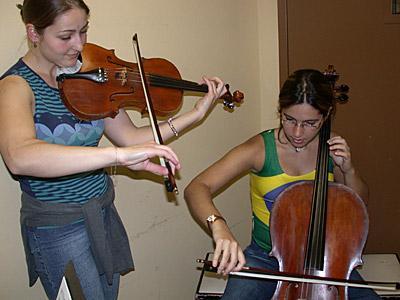Undergraduate international students comprise a higher percentage of students in the School of Music than any other University college except engineering, according to the Office of Budget and Planning’s Web site.
Nearly 6 percent of undergraduates in the School of Music are international students, compared to 4.5 percent in business administration, 2.7 percent in basic sciences and 1.7 percent in agriculture.
Without a University-driven recruitment program or overall financial assistance for international students, individual colleges and departments must find their own way to bring international students to LSU.
Part of the reason for the large percentage of international students in the School of Music is the faculty, said Associate Dean Sara Lynn Baird. Some of the faculty come from other countries and thus recruit students from those countries to come to LSU.
Faculty perform concerts professionally in America and abroad, Baird said. While abroad, professors use these concerts to recruit international students.
“The students I’ve recruited from other countries I’ve met in their countries,” said Dennis Parker, a cello professor.
When performing abroad, faculty are paid as performers, defraying the costs of travel that would otherwise come out of the School of Music’s pocket, Parker said. The money is not enough to live on but does enough to help faculty recruit foreign students.
But performing is not the only way to recruit.
Kevork Mardirossian, a violin professor from Bulgaria, recruits abroad by holding master classes every year in Bulgaria, Spain and England.
The classes give international students an opportunity to show an interest in continuing their studies in America, Mardirossian said. By giving concerts and offering his classes, students from Bulgaria, England, China, Spain, Albania and Romania have attended the School of Music at LSU.
“They have raised the level within the University,” Mardirossian said.
Recruiting poses its own difficulties, Parker said. A trip is productive if one student can come to LSU, he said.
“If I go to Turkey and even one student can get through bureaucracy, pass their TOEFL exam and get a visa, you’re already pretty lucky,” Parker said.
The School of Music offers financial assistance to international students, Parker said.
International students can receive scholarships through private donations given by community members and former professors, Mardirossian said.
The scholarships are supplemented by fund-raising events such as the School of Music Spectacular held every fall in the Union, he said.
Some string students receive assistance through an LSU Foundation scholarship set up strictly to help “whoever is extremely talented but not financially able,” Mardirossian said.
Nazig Tchakarian and Martin Dimitrov, music students from Bulgaria, supplement their scholarships by playing in the Baton Rouge and Acadiana symphonies.
Tchakarian, a junior, said she makes about $260 a month playing in the symphony. Her scholarship pays for her tuition.
Dimitrov, a senior, said music students cannot work other jobs because of their heavy school schedule.
The experience of playing professionally helps, even though the symphony is only part time, Dimitrov said.
Mardirossian said 75 percent of the students who play in the Baton Rouge symphony are international students. In the University’s production of “The Marriage of Figaro,” nine of the 11 violinists were Bulgarian.
By participating in the school’s curricular practical training, the students increase their job potential, Baird said.
Mardirossian said funding for scholarships is still problematic, especially when compared to scholarships given to athletes.
“Musicians can improve their entire lives, not just 10 to 15 years,” Mardirossian said.
Faculty find recruits when abroad
April 2, 2003

Faculty find recruits when abroad



